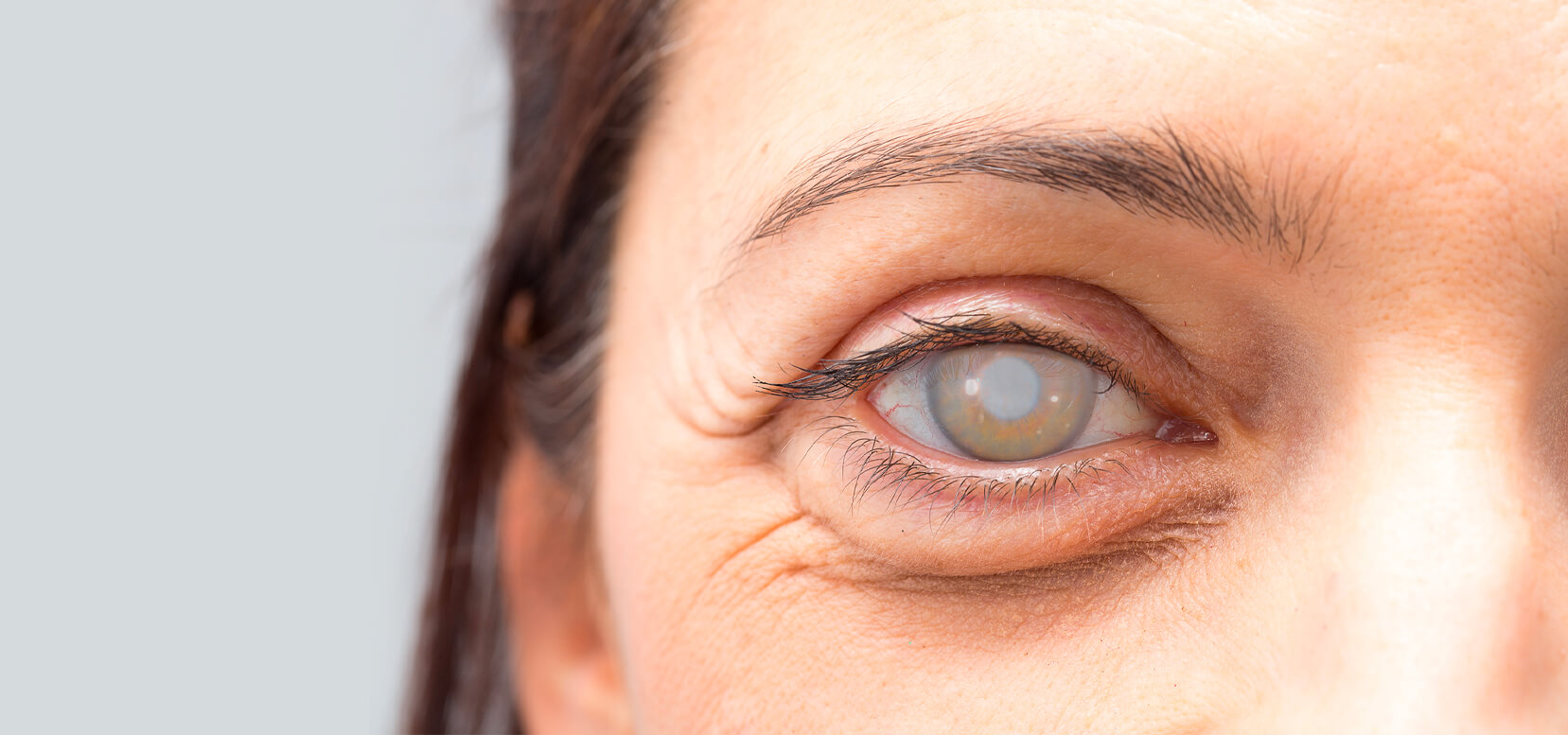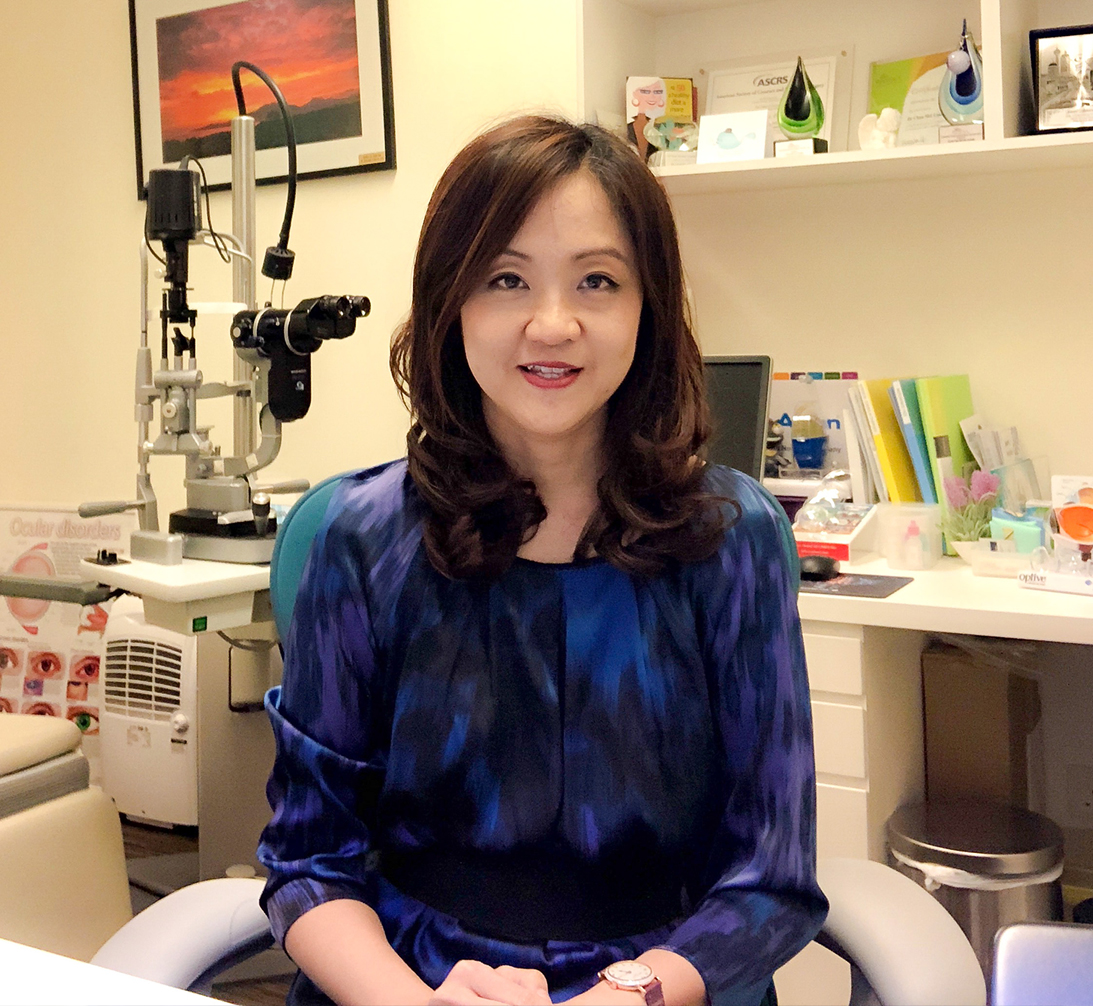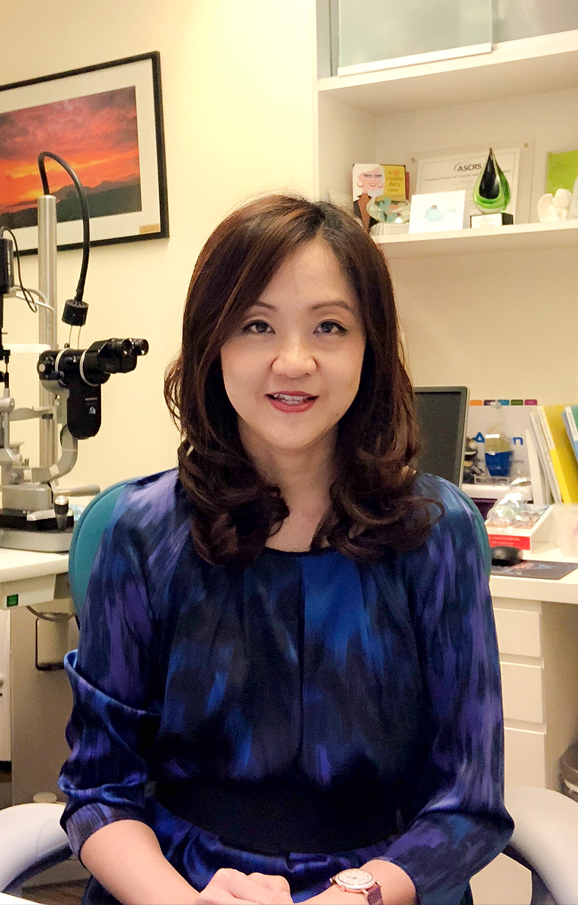Cataract Surgery in Singapore

What is a Cataract?
A cataract is a loss of transparency or clouding of the lens of the eye. The normal lens is crystal clear. As one ages, however, chemical changes occur in the lens that make it less transparent, thereby obstructing the passage of light through the lens and affecting one’s clarity of vision.
Cataracts are not all the same and may be mild, moderate or severe.
What Causes Cataracts?
The primary cause of cataracts is ageing, as the proteins in the lens break down over
time.
However, other factors can contribute, including:
- Diabetes
- Smoking
- Prolonged UV Exposure
- Family History of cataracts
- Eye Trauma
- Steroid Use
Types of Cataracts
Cataracts are broadly classified by their location within the lens and their underlying cause:
- Nuclear Sclerotic Cataract – This is the most common type, forming in the central core (nucleus) of the lens and is strongly associated with the natural ageing process.
- Cortical Cataract – Appearing as wedge-shaped opacities, these develop in the lens's outer layer (cortex) and extend inwards.
- Posterior Subcapsular Cataract – Located near the back surface of the lens, often forming rapidly and commonly causing significant glare and difficulty with reading vision.
- Congenital Cataract – Present at birth or developing in early childhood, often due to genetic factors, infections during pregnancy, or developmental issues.

What are the Symptoms of Cataract?
- A progressive and painless blurring of vision
- Glares, particularly at night or in dim settings
- A need for frequent spectacle prescription changes
- A change in colour perception
- Doubling of the image in the affected eye (less common)
Be careful! Sometimes, cataracts may cause an improvement in one’s near vision (thus reducing one’s reliance on reading glasses), giving a false impression that one’s vision is improving.
How Are Cataracts Diagnosed?
Diagnosing cataracts involves a thorough eye examination, typically including:
- Visual Acuity Test – This measures the sharpness of your vision at different distances.
- Slit-Lamp Examination – This involves a detailed inspection of the front structures of your eye, such as the cornea, iris, and lens.
- Retinal Examination – This evaluates the back of your eye, including the retina and optic nerve, to check for other conditions.
- Lens Photography – This captures images of the lens to assess cataract severity, often utilising a standardised system like the Wisconsin Cataract Grading System.
Cataract Surgery: An Effective Treatment Option
While early cataracts can sometimes be managed with updated prescriptions or lifestyle changes, surgery remains the only effective solution when vision loss starts to interfere with daily life. Cataract removal surgery in Singapore involves replacing the cloudy lens with an artificial intraocular lens (IOL).
Our clinic offers cataract surgery in Singapore, performed by the experienced eye surgeon, Dr Cordelia Chan. We tailor treatment plans to your eye health, lifestyle, and visual goals, ensuring a smooth recovery. Timely surgery is advised, as delays can lead to more complications and a longer recovery.
What Cataract Treatments Should I Consider?
Not all cases of cataract require cataract surgery. If the visual blurring is still mild, surgery is usually not required yet. However, if the blurring is significant enough to affect your daily activities, then cataract removal surgery in Singapore will be recommended. Contrary to popular belief, you should not wait until the cataract is too dense, mature or opaque before undergoing surgery, as complications are more likely to occur. Recovery from complicated cataract removal surgery often takes a longer time as well.
Types of Cataract Removal Surgery in Singapore
Cataract removal surgery is a very safe, successful and life-changing operation as the old cloudy lens is replaced with a new and clear one. There are 3 types of cataract surgery and your Singapore cataract surgeon will discuss your options and make the most appropriate recommendation for you.
Phacoemulsification (Phaco)
A small incision in the eye is first made (using a blade through a small wound), and a special device using high-frequency ultrasound energy is used to soften and break down the cataract for easier removal. A clear artificial lens is then placed in the eye to restore vision.
This procedure is usually done under local anaesthesia and takes less than 30 minutes. The incision is self-sealing, so no stitches are typically needed. Recovery is generally quick, with most patients noticing improved vision within a few days.
Femtosecond Laser-assisted Cataract Surgery (FLACS)
Most notably, no blades are used in this method. Popularly known as the bladeless cataract surgery in Singapore, a highly precise femtosecond laser is used to create the wound and facilitate the removal of the cataract. The cloudy lens is then also removed via ultrasound.
Extracapsular Cataract Surgery (ECCE)
Extracapsular Cataract Extraction (ECCE) is a more traditional approach to cataract surgery that requires a larger incision in the eye to remove the cloudy lens. Due to the size of the incision, sutures are usually needed to close the wound, leading to a longer recovery period compared to modern techniques like phacoemulsification.
While ECCE is no longer the standard procedure for most cataract cases, it remains an important option in specific situations such as those involving dense, mature, or complex cataracts.
Am I a Good Candidate for Bladeless Cataract Surgery?
You may be suitable for bladeless cataract surgery in Singapore if you:
- Have cataracts affecting your daily vision
- Prefer a precise, laser-assisted approach
- Are considering premium IOLs like multifocal or toric lenses
- Have healthy eye structures, especially the cornea and retina
- Do not have conditions such as severe dry eye, uncontrolled glaucoma, or corneal scarring
- Are in overall good health and not pregnant or breastfeeding
A thorough consultation with our cataract surgeon will help determine if this approach is right for you. Schedule your evaluation to explore the best options for your vision needs.
Intraocular Lenses (IOLs): Essential for Every Cataract Surgery
Monofocal IOLs
Multifocal IOLs
How to Prepare for Cataract Surgery
Proper preparation helps ensure a smooth procedure and recovery. During your consultation, share any vision changes, medical conditions (such as diabetes or hypertension), medications, and allergies with your doctor. You will also undergo a comprehensive eye exam and precise measurements to select the most suitable intraocular lens (IOL).
Before surgery, you may need to:
- Stop certain medications
- Begin using prescribed eye drops
- Refrain from eating or drinking for 6 to 8 hours before the procedure
- Avoid wearing makeup or lotion on surgery day
- Arrange for someone to accompany you home
What to Expect After Cataract Surgery
Most people experience mild discomfort or blurry vision at first, but notice clearer vision within a few days. Full recovery can take up to 4 to 6 weeks, depending on your health and the condition of your eyes.
Post-Surgery Aftercare
Proper aftercare helps ensure a smooth recovery. Use your prescribed eye drops as directed to reduce inflammation and prevent infection. An eye shield may be recommended during sleep to protect the healing eye.
Limit physical activity in the first few days. Avoid driving, bending, heavy lifting, and swimming until your doctor advises otherwise. Sunglasses can help with light sensitivity.
Avoid eye makeup and exposure to dust or smoke for at least a week. Be sure to attend all follow-up appointments to monitor your progress and address any concerns.
Possible Complications of Cataract Surgery
Cataract surgery is generally safe, with most patients experiencing excellent outcomes and recovery.
However, like all surgical procedures, it carries some risks, such as:
- Infection
- Bleeding
- Retinal Detachment
- Glaucoma
- Vision Loss
Choose Cordelia Chan Eye Centre for Cataract Surgery
Cordelia Chan Eye Centre is among the top trusted clinics in Singapore for cataract surgery. Here are some reasons to choose our eye centre:
Take the first step towards brighter, clearer vision with confidence. Contact our surgeon today to schedule your cataract surgery consultation and discover the difference our care can make.
Frequently Asked Questions
How much does LASIK surgery cost in Singapore?
Do cataracts return after surgery?
Can I have cataract surgery after LASIK?
How long does cataract surgery take?
Is cataract surgery covered by insurance or MediSave?
Can I have cataract surgery after ReLEx SMILE eye surgery?
MBBS (S’pore), FRCS (Edinburgh), MMed (S’pore), FAMS (Ophth)


Dr Cordelia Chan is a highly experienced ophthalmologist and cataract surgeon, having devoted close to 30 years of her career to the specialty. The former Head of the Refractive Surgery Service at the Singapore National Eye Centre and cataract surgery teacher and mentor of many of the current ophthalmologists practising in Singapore and internationally, Dr Chan is no doubt well-recognised in her craft.
